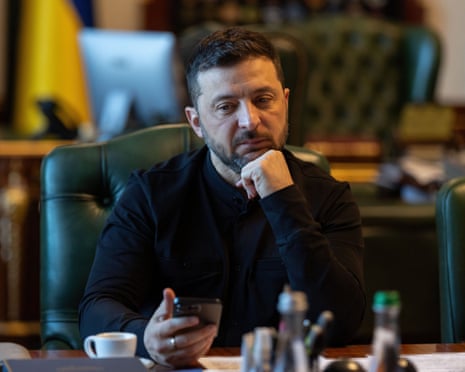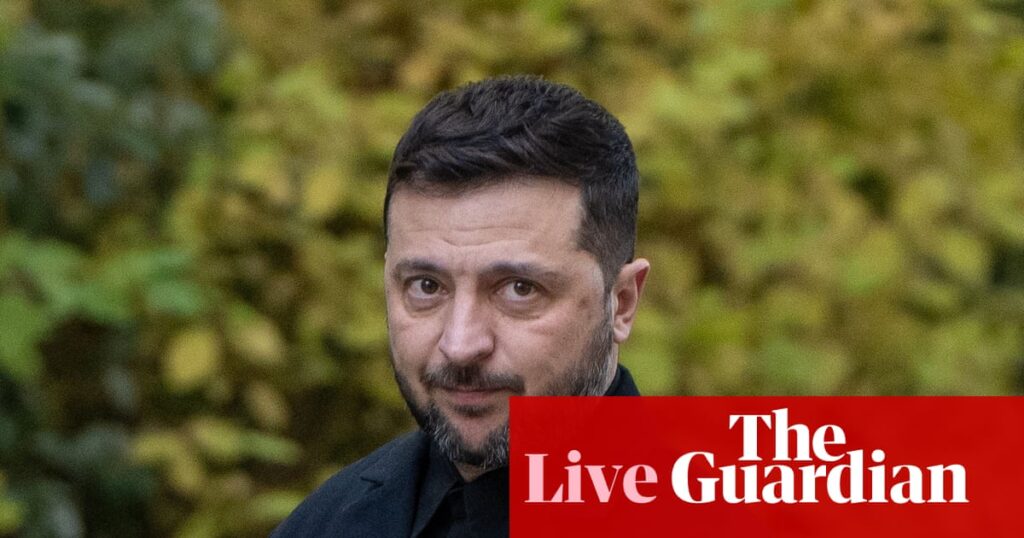Morning opening: Zelenskyy ready for talks, but will take no steps back, and needs financial support
Jakub Krupa
The Ukrainian president, Volodymyr Zelenskyy, said Kyiv was ready for peace talks anywhere besides Russia and Belarus, but stressed Ukrainian forces would “take no steps back” or cede territory.

In comments reported by Reuters and AFP, Zelenskyy also stressed that Ukraine needed European financial support to continue fighting the Russian forces for another two or three years, as the EU’s plan to use frozen Russian assets to back is stuck due to Belgium’s opposition.
“I emphasised this again to all European leaders. I told them that we are not going to fight for decades, but you must show that for some time you will be able to provide stable financial support to Ukraine,” the Ukrainian president said in comments released this morning.
The timing here is probably not accidental: Belgian prime minister Bart de Wever, who faces domestic pressure over the country’s draft budget, is set to meet Nato’s secretary general Mark Rutte later today, and the issue is near certain to feature in their talks.
Separately, Zelenskyy also urged US president Donald Trump to put more pressure on Chinese leader Xi Jinping to cut his support for Russia during their meeting this week.
“I think this may be one of [Trump’s] strong moves, especially if, following this decisive sanctions step, China is ready to reduce imports” from Russia, he told journalists.
But one European leader, seen as the main candidate to host potential future talks between Trump and Russia’s Vladimir Putin, appeared to be unhappy with the growing US pressure on Russia.
The Hungarian prime minister, Viktor Orbán, told Italian reporters at the Vatican that he thought Trump’s sanctions on Russian oil majors were wrong from the Hungarian point of view, as they could risk a hike in energy prices.
Unsuprisingly, he appears to be isolated in his view, with the Finnish defence minister, Antti Hakkanen, praising the new sanctions, calling the move a major sign of resolve by the US president against Vladimir Putin’s three-year long war.
Expect to hear more on this today, as Nordic leaders meet in Stockholm, with EU’s Ursula von der Leyen joining them for talks, which will no doubt cover Ukraine, too.
It’s Tuesday, 28 October 2025, it’s Jakub Krupa here, and this is Europe Live.
Good morning.
Key events
-
Nordics, EU back plans to use frozen Russian assets to fund Ukraine, hopeful of convicing Belgium to agree
-
Russia is ‘real threat,’ Nordic leaders say, but they stress ‘we are not afraid, but prepared’
-
‘We face greatest threat since WW2,’ Danish PM warns, says Russia is ‘trying to weaken our societies’
-
Ukraine war and Russia’s reckless behaviour made Nordics ‘a hotspot,’ Finnish PM warns
-
Nordic talks focus on security, competitiveness, support for Ukraine, leaders say
-
Belarus president calls Lithuanian border closure ‘crazy scam,’ criticises EU plans to use frozen Russian assets
-
Morning opening: Zelenskyy ready for talks, but will take no steps back, and needs financial support
Nordics, EU back plans to use frozen Russian assets to fund Ukraine, hopeful of convicing Belgium to agree
Asked about Ukraine’s financial situation, as mentioned earlier today by Volodymyr Zelenskyy, the EU’s von der Leyen says it is “an important step forward that we look at the immobilised Russian assets.”
“The proposal is to take these cash balances to give a loan to Ukraine that Ukraine has to pay back if Russia pays reparations. And therefore it’s legally a sound proposal, not trivial, but a sound proposal,” she says.
She says the European Council “asked for potential options to technical questions that we have there, so we will come with that,” but insists that “the basic message is very clear towards Russia.”
We’re in for the long haul. We are ready to cover the financing needs of Ukraine, so that we are standing by Ukraine for as long as it takes.
In a show of unity, Sweden’s Kristersson, Denmark’s Frederiksen and Finland’s Orpo back her up, saying they “very much agree” and “strongly agree” with the commission’s proposal.
Orpo goes as far as to say that “we have to continue to support Ukraine, we have to find a solution so we can finance their fight … and I see that only reasonable solution is to use Russian frozen assets.”
He says he is “optimistic” that leaders can resolve the legal issues around the use of frozen assets and “find a solution with Belgium” at the European Council meeting in December.
Russia is ‘real threat,’ Nordic leaders say, but they stress ‘we are not afraid, but prepared’
The leaders now get asked about the threat from Russia.
Norway’s Jonas Gahr Støre says Norway traditionally “follow very closely” any tests of Russian military technology, conscious that “we live 100 kilometres from the world’s largest nuclear arsenal.”
“One strength of Nato is that we are ears and eyes to follow that [testing,]” he says.
Støre says the newly tested weapons do not appear to be “directed primarily against us,” but he says it is “a worrying sign that so much emphasis is being put into these developments.”
He says “we are not afraid, but we are prepared.”
“So if we do our work correctly, we are a threat to no other country, but no other country should have the idea of threatening us. And that is that makes us a pretty confident that we will be able to take care of our own security in that way,” he says.
Finland’s Petteri Orpo strikes a similar tone, as she states clearly that “Russia is threat number one, and it’s crucial, because it will be that when the war ends in Ukraine, it’s clear that … Russia will move their military forces to their western borders, behind our borders.”
“It’s a real threat for us,” he stresses.
‘We face greatest threat since WW2,’ Danish PM warns, says Russia is ‘trying to weaken our societies’
Denmark’s Mette Frederiksen strikes similar tone as she repeats her warning that “we face the greatest threat since the second world war,” as “Russia is trying to weaken our societies and to divide us.”
“They shall know that they will never succeed,” she says defiantly.
She adds that the Nordics “have to continue our strong support to Ukraine,” as it remains “the first line of defence for the entire Europe,” and pushes for European countries to “rearm ourselves.”
Ukraine war and Russia’s reckless behaviour made Nordics ‘a hotspot,’ Finnish PM warns
Finland’s Petteri Orpo makes it very clear what he thinks of Russia, as he says that “the war in Ukraine and Russia’s reckless behaviour at the Baltic Sea region have made our region a hotspot.”
“This has changed our work in the European Union and our work amongst the Nordics – the countries, the small countries of the region, know that we need to work together to be stronger, and this is what we have also discussed today,” he says.
Nordic talks focus on security, competitiveness, support for Ukraine, leaders say
The leaders are now speaking in Stockholm after the Nordic Council meeting earlier today.
In his opening remarks, Sweden’s Ulf Kristersson said the leaders spoke about “enhancing our common security and competitiveness in times when European and Nordic cooperation is more important and closer than ever before.”
He also pointedly spoke about the need to “take full responsibility for our own security, and we do support Ukraine, for them and for ourselves.”
His comments are echoed by the EU’s Ursula von der Leyen, as she summed up the talks on readiness, preparedness, and competitiveness, including on clean tech, but also on “how to maintain our strong support to Ukraine” and pointedly talked about the need to “deter a rogue neighbour in the East,” which, you know, sounds very much like Russia.
Meanwhile, the Kremlin said it would “destroy” all foreign fighters helping Ukraine to defend itself against Russia, after noting that Russian troops were constantly hearing foreign languages spoken among those fighting for Ukraine on the frontline, Reuters reported.
Moscow also blamed Ukraine for “the pause” in peace talks, without offering any evidence to back this up.

Jakub Krupa
As mentioned earlier, we are expecting a press conference on the sidelines of the Nordic Council meeting today in the next twenty minutes or so, with regional leaders – including Sweden, Denmark, Finland and Norway – joined there by the EU’s Ursula von der Leyen.
I will keep an eye on this for you and bring you all the latest lines here.
Belarus president calls Lithuanian border closure ‘crazy scam,’ criticises EU plans to use frozen Russian assets
Meanwhile, the Belarusian autocratic leader, Alexander Lukashenko, did not mince his words as he responded to Lithuania’s decision to close its border with Belarus over smuggler balloons disrupting the air traffic and causing airport closures.
Lukashenko called the border closure “a crazy scam” aimed at disrupting Chinese trade flows in the area, even as he nominally said he would be ready to apologise if Minsk was genuinely responsible for the disruptions.
In comments reported by Belarusian state news agency Belta and Reuters, Lukashenko said that Lithuania had “come up with an absurd excuse, these balloons, even for a small country like Lithuania.“
The Belarusian president also strongly opposed the western plans to use Russian frozen assets calling it “a theft,” as he separately tried to argue that the deployment of the Russian Oreshnik missile system in Belarus was not an aggressive move, but merely a precautionary move to ensure security of his country.
Morning opening: Zelenskyy ready for talks, but will take no steps back, and needs financial support

Jakub Krupa
The Ukrainian president, Volodymyr Zelenskyy, said Kyiv was ready for peace talks anywhere besides Russia and Belarus, but stressed Ukrainian forces would “take no steps back” or cede territory.
In comments reported by Reuters and AFP, Zelenskyy also stressed that Ukraine needed European financial support to continue fighting the Russian forces for another two or three years, as the EU’s plan to use frozen Russian assets to back is stuck due to Belgium’s opposition.
“I emphasised this again to all European leaders. I told them that we are not going to fight for decades, but you must show that for some time you will be able to provide stable financial support to Ukraine,” the Ukrainian president said in comments released this morning.
The timing here is probably not accidental: Belgian prime minister Bart de Wever, who faces domestic pressure over the country’s draft budget, is set to meet Nato’s secretary general Mark Rutte later today, and the issue is near certain to feature in their talks.
Separately, Zelenskyy also urged US president Donald Trump to put more pressure on Chinese leader Xi Jinping to cut his support for Russia during their meeting this week.
“I think this may be one of [Trump’s] strong moves, especially if, following this decisive sanctions step, China is ready to reduce imports” from Russia, he told journalists.
But one European leader, seen as the main candidate to host potential future talks between Trump and Russia’s Vladimir Putin, appeared to be unhappy with the growing US pressure on Russia.
The Hungarian prime minister, Viktor Orbán, told Italian reporters at the Vatican that he thought Trump’s sanctions on Russian oil majors were wrong from the Hungarian point of view, as they could risk a hike in energy prices.
Unsuprisingly, he appears to be isolated in his view, with the Finnish defence minister, Antti Hakkanen, praising the new sanctions, calling the move a major sign of resolve by the US president against Vladimir Putin’s three-year long war.
Expect to hear more on this today, as Nordic leaders meet in Stockholm, with EU’s Ursula von der Leyen joining them for talks, which will no doubt cover Ukraine, too.
It’s Tuesday, 28 October 2025, it’s Jakub Krupa here, and this is Europe Live.
Good morning.

